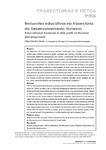Mostrar o rexistro simple do ítem
Horizontes educativos na traxectoria do desenvolvemento humano
| dc.contributor.author | Montero Souto, Pablo | |
| dc.date.accessioned | 2011-07-12T10:20:28Z | |
| dc.date.available | 2011-07-12T10:20:28Z | |
| dc.date.issued | 2009 | |
| dc.identifier.citation | Ambientalmente Sustentable, 2009, 8: 65-85. ISSN: 1887-2417 | es_ES |
| dc.identifier.issn | 1887-2417 | |
| dc.identifier.uri | http://hdl.handle.net/2183/7402 | |
| dc.description.abstract | [Resumo] Os Relatorios do Desenvolvemento Humano, publicados polo Programa das Nacións Unidas para o Desenvolvemento dende a década dos noventa, conteñen un conxunto de importantes referentes pedagóxicos para validar a necesidade dunha Educación Social e Ambiental de marcado carácter ético, cívico e político. Con tal hipótese, a lectura do concepto Desenvolvemento Humano, institucionalizado no seno da Organización das Nacións Unidas, suxire que a educación ten que servir para ampliar as opcións das persoas e dos grupos sociais, brindándolle a cadaquén a oportunidade de levar unha vida que teña motivos para valorar, de modo que os poboadores do planeta poidan exercer a liberdade de ser quen son para participar de todos beneficios do seu desenvolvemento. En todo caso, remitindo estas perspectivas ao proxecto dunha educación que está chamada a ser eminentemente crítica cos actuais modelos de riqueza, crecemento, progreso, benestar social, calidade de vida etc., tanto como coa xeración das alternativas que os veñan a substituír. | es_ES |
| dc.description.abstract | [Abstract] The Human Development Reports, published by the United Nations Development Program since the 1990’s, contain a set of important pedagogical referents to justify the need for a Social and Environmental Education of a markedly ethical, civic and political nature. Based on such a hypothesis, the reading of the concept of Human Development, institutionalized at the heart of the United Nations Organization, suggests that education must serve to widen the options of different people and social groups, offering each one the opportunity to lead a life they have reasons to value, so that the inhabitants of the planet may exercise the freedom to be who they are and take part in all the benefits of their development. In any case, these perspectives point to the project of an education that is meant to be essentially critical with the current models of wealth, growth, progress, social welfare, quality of life, etc., as well as with the generation of the alternatives that are to replace them. | es_ES |
| dc.language.iso | glg | es_ES |
| dc.publisher | Universidade da Coruña | es_ES |
| dc.subject | Desenvolvemento humano | es_ES |
| dc.subject | PNUD | es_ES |
| dc.subject | Obxectivos de Desenvolvemento do Milenio | es_ES |
| dc.subject | Década da educación para o desenvolvemento sustentable | es_ES |
| dc.subject | Human development | es_ES |
| dc.subject | Milennium Development Goals | es_ES |
| dc.subject | Decade of Education for Sustainable Development | es_ES |
| dc.title | Horizontes educativos na traxectoria do desenvolvemento humano | es_ES |
| dc.type | info:eu-repo/semantics/article | es_ES |
| dc.rights.access | info:eu-repo/semantics/openAccess |






